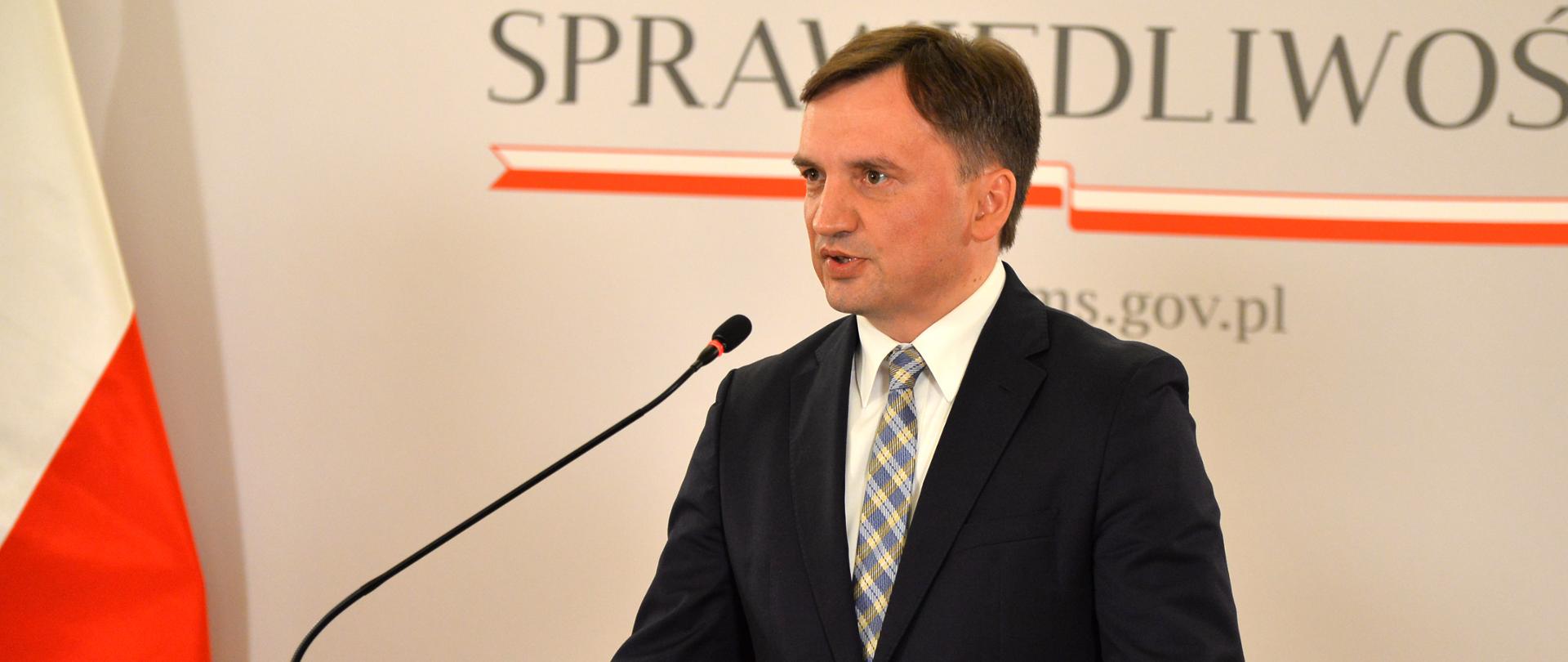
In early July 2024, the Ministry of Justice published a registry of over 4 000 civilian law contracts concluded between 2019 and 2023 with external entities. The analysis reveals that during this period the ministry, led by Zbigniew Ziobra, allocated over a billion zlotys to these contracts. These papers cover both large contracts with IT companies, energy suppliers and Polish Post, as well as contract contracts for experts, trainees and assistants, as well as grants for institutions related to the governing camp, specified as the Academy of Justice.
Lack of transparency in publications
The Ministry, erstwhile publishing the contract register, has only disclosed the names of economical operators and organisations, disregarding the names of natural persons signing contracts. In consequence to our request to disclose these names, we have received information about any individuals associated with the government and its structures.
Examples of employees
Among those employed on civilian law contracts are young people as well as a law student who in 2019 worked on a "substantial analysis of writings" for the Reprivatisation Commission led by Patrick Jake, as well as more controversial figures specified as prof. Jacek Bartyzel. Bartyzel, widower of PiS MP Margaret Bartyzel, prepared for the ministry an opinion entitled "The character of LGBT ideology in the context of the rule of non-discrimination of people on canva terms utilized in the case law of administrative courts" for PLN 2 1000 gross. His controversial statements on refugees and anti-immigration policies have caused much controversy. In 2015, Bartyzel described refugees as “invaders” and criticized immigration policy.
Bonuses for activists of Sovereign Poland
Civil law contracts with the Ministry of Justice were besides signed by activists of Sovereign Poland. For example, Dariusz Matecki, presently a MP who earned over PLN 250,000 in full for the "service of social media". In 2019, Matecki was 1 of Zbigniew Ziobry's account administrators. Another activist, Martin Świegodziński, served as “Coordinator of the Advisory College” at the editorial board “Probation” for PLN 18 1000 in 2021. Rafał Drzewiecki, erstwhile Deputy Head of Ziobry's Cabinet, performed “analytical and advisory activities” for PLN 131 1000 in 2019 and signed a contract for PLN 216 1000 in 2022. Barbara Chrobak, a erstwhile MP, represented Deputy Minister of Justice Michał Wójcik in "refuges and correction plants" for PLN 53 1000 in 2020.
Cooperation with law firms
The Ministry besides utilized the services of respective law firms. Maciej Zaborowski's law firm, Ziobra's assistant from the time of the first regulation of the Law and Justice, received a wage of almost a million zlotys. Another law firm, led by patron Krzysztof Wąsowski, who presently defends Father Michał O., received about PLN 0.5 million for his services. It is worth noting that despite the employment of permanent lawyers, the ministry frequently utilized external specialists to handle complex legislative and global judicial projects.
Legal experts and the Neos Judges
Among the legal experts employed by the ministry were besides neojudges and loyal prosecutors. Prof. Jakub Stelina of the University of Gdańsk, who wrote a legal opinion concerning the refusal to give opinions to candidates for judges, was later elected justice of the Constitutional Court. Prof. Anna Łabno from the University of Silesia and Prof. Bogumił Szmulik from the University of Cardinal Stefan Wyszynski besides prepared expertise for the ministry. Prof. Jarosław Szymanek wrote a legal opinion justifying the acquisition of the Constitutional Court by the Law and an opinion on the Istanbul Convention. Dr Andrzej Pogłodek of the UKSW prepared expert opinions on the improvement of the judiciary.
The orders from the ministry were besides taken by neo-judge Paweł Dzienis, who was promoted to the neo-judge of the Białystok territory Court in 2021. From 2006 to 2015, Dzienis "did not hold any position of function in the territory Court of Białystok", and from 2015 to 2018 "was delegated by the minister to execute administrative tasks" in the Ministry.
Prof. Kamil Zaradkiewicz, president of the technological Council of this letter, who was manager of the Department of Administrative Law in the Ministry, frequently wrote to the ministry's quarterlys. For 1 of the texts for “Probation” in 2022 he received almost 11 1000 PLN.
Zaradkiewicz was 1 of the key representatives of the legal community supporting the improvement of the justice strategy forged by PiS. His appointment as acting First president of the ultimate Court in 2020 (was only 15 days) – as successors to justice Margaret Gersdorf – was seen as intended to strengthen the influence of the Law and Justice Government on the SN.
Among the neo-judges, Tomasz Demendecki, PhD promoter (at a private university) of Deputy Minister of Justice Łukasz Piebiak, until 2018 a bailiff, later a neo-judge of the ultimate Court ruling in the illegal Chamber of Extraordinary Control and Public Affairs, of which the European Court of Human Rights ruled in November 2021 was not an independent and impartial court, due to the fact that “the procedure for appointing judges was unduly influenced by the legislative and executive authorities.” In another judgement of December 2023, the CJEU concluded that ‘all elements, both systemic and specific, which were characterised by the appointment of IKNiSP judges, have the effect of not having the position of an independent and impartial court’.
Experts and legal opinions of the Ministry of Justice
One of the key experts working with the ministry was Dr. Marek Bielecki, Dean of the Academy of War Art, specialist in religious, canonical and traffic law. Bielecki prepared an opinion, which was expected to be a "underlay" for the ministry after the criticism of Jarosław Kaczyński, concerning the usage of the Justice Fund to fund electoral campaigns. In his report, Bielecki stated that "It is not possible to require legally functioning bodies to carry out their actions, based on the current rules, not during the election campaign" (source: "Gazeta Wyborcza", August 2024). In addition, in 2021 Bielecki prepared an opinion on "Elected provisions of the amendment of the Law on the General Courts in the field of compliance with the Constitution" for PLN 5.5 thousand.
Another frequently cooperating lawyer was Czesław Kłak, prof. and Rector of Kujawsko-Pomorskie Higher School in Bydgoszcz. In 2018, on the advice of the PiS MPs, he became a justice of the Court of State and a associate of the National Council of Prosecutors. Kłak prepared opinions for the Ministry of Justice concerning, among others, corruption in companies of the Treasury and the improvement of the National Judicial Council, and his reports from 2019-2023 were valued at over 46 1000 PLN.
Canonists and constitutionalists: Opinions for the Ministry
In 2021, the Ministry of Justice utilized legal opinions prepared by specialists in various fields of law, including:
- Prof. Artur Mezglewski from the Academy of War Art, a specialist in canon law, who for PLN 5.5 1000 analysed the rules on compliance of the “reform” of the judiciary.
- Dr. Krzysztof Prokop, prof. of the University of Natural Sciences and Humanities in Siedlce, who prepared 2 studies valued at a full of PLN 11,000.
- Dr. Jerzy Nikolaev, associate prof. of the University of Opole, specialising in spiritual law, who prepared an opinion for PLN 5.5 thousand.
Prof. Dobrochna Bach-Golecka from the University of Warsaw, doctor of theological sciences, in 2021 she analysed "materials in terms of the existence of legal issues in the sphere of competence of the Minister of Justice" for over PLN 14 thousand. However, her candidacy for the position of justice of the EU Court of Justice was withdrawn in 2023 due to irregularities in the competition procedure.
Further cooperation and experts
Grzegorz Pastuszko, a associate of the technological Council of the Institute of Justice, prepared an opinion in 2020 on the "draft law amending the Act on peculiar Solutions for Preventing, Preventing and Combating COVID-19" for PLN 5 thousand. In 2024 he was appointed to justice the ultimate Court in the home of Extraordinary Control and Public Affairs.
Filip Warmy, expert of Ordo Iuris, prepared an opinion for the ministry for PLN 5 1000 in 2020. Warmly reported his candidacy to the ultimate Court in 2018, nevertheless the neoKRS rejected it. From 2021 to 1923, he was a associate of the technological Council of the De Republica Institute, which promotes Polish past and culture, and supports research.
Another external specialist was Dr. Marcin Olszówka, erstwhile manager of the Constitutional and Administrative Law Department at the Government Legislative Centre.
Summary
The analysis of civilian law contracts concluded by the Ministry of Justice in 2019-2023 reveals a wide scope of experts and lawyers who had a crucial influence on the creation of opinions and expertise supporting the activities of the then authority. These included both canon law, constitutional law and spiritual law experts whose opinions were crucial in legitimising judicial reforms and another government activities.
The contract registry points to the intensive usage of external experts, which underlines the function of legal opinions as a tool supporting the political and legislative objectives of the ruling coalition.
More here:
The hotel Ziobry has richly rewarded its organization plots and the "eskeprts" of close authorities


















